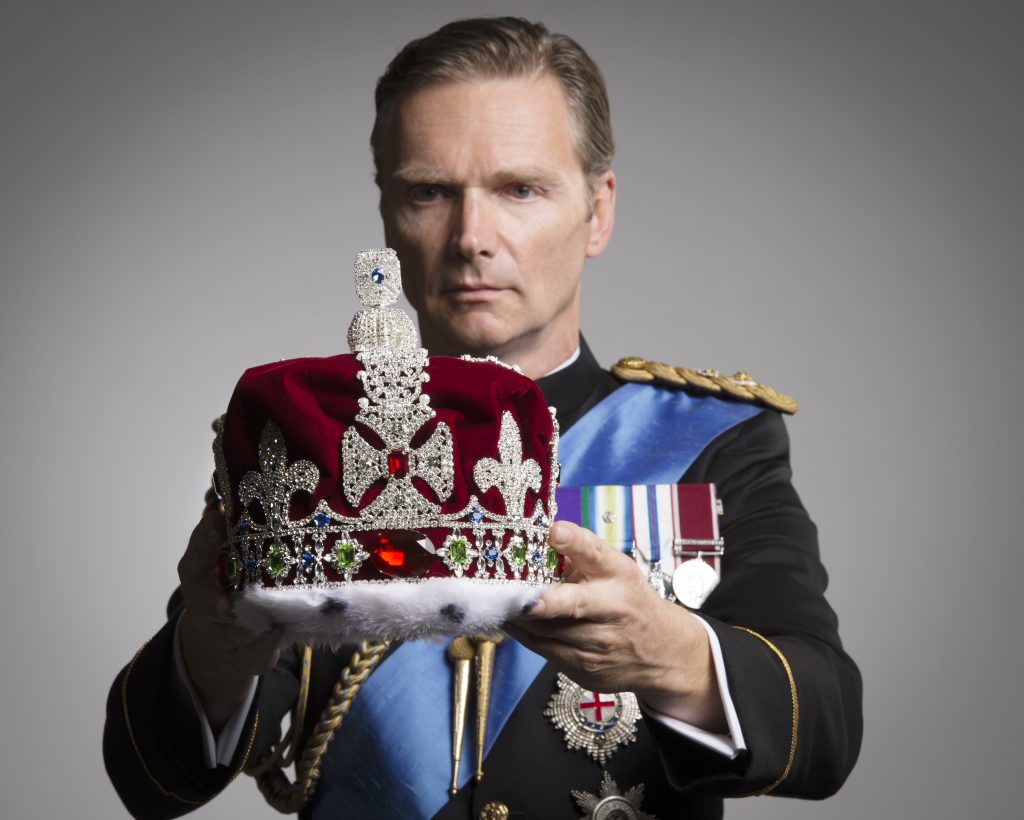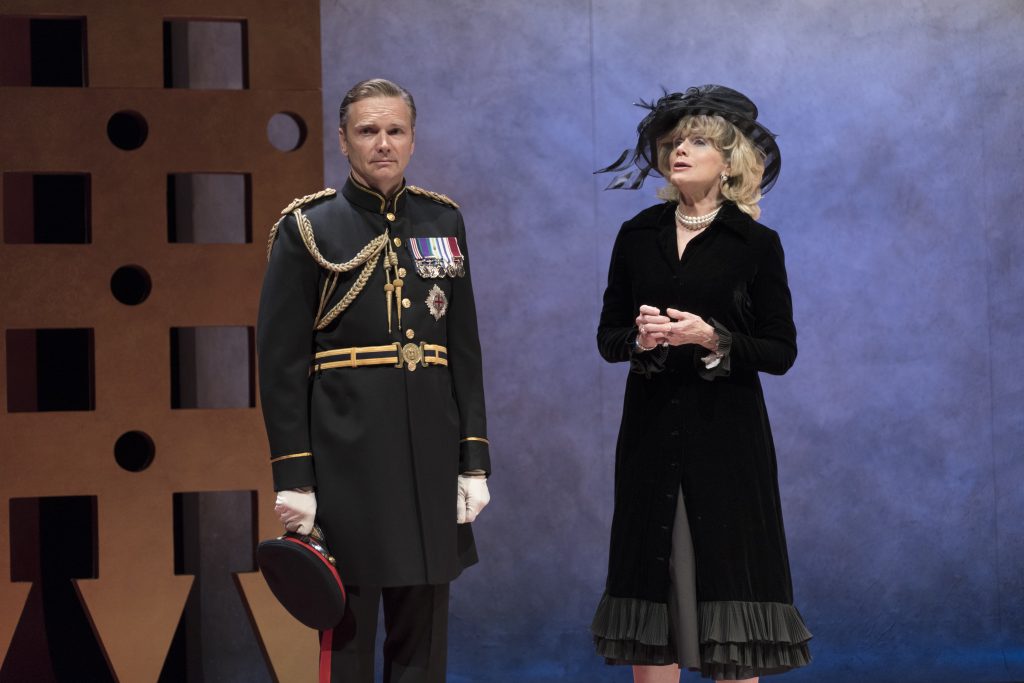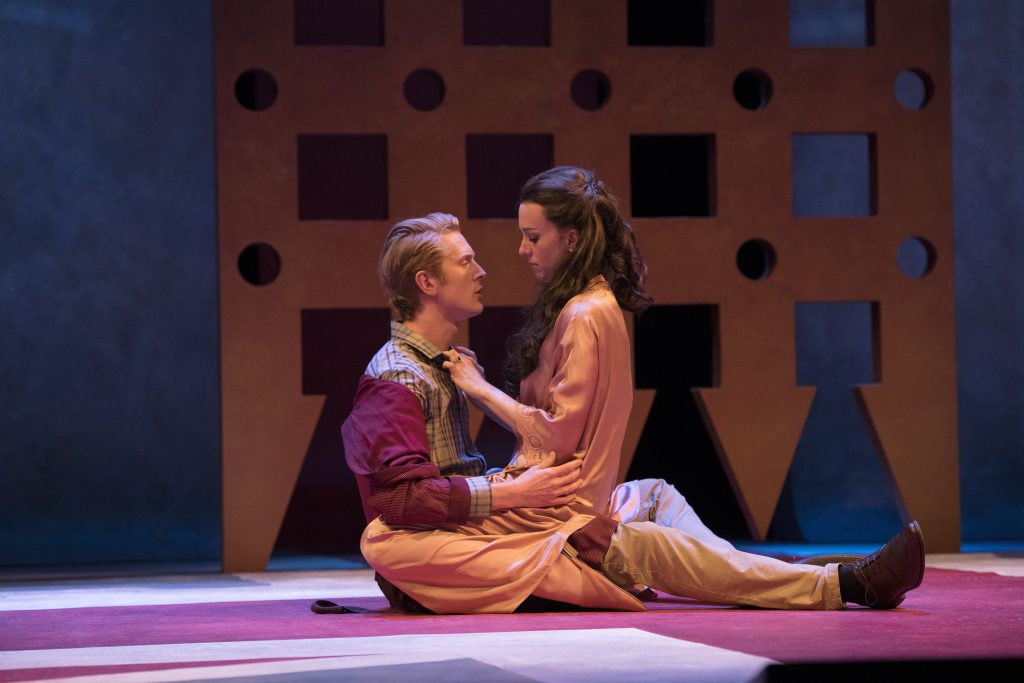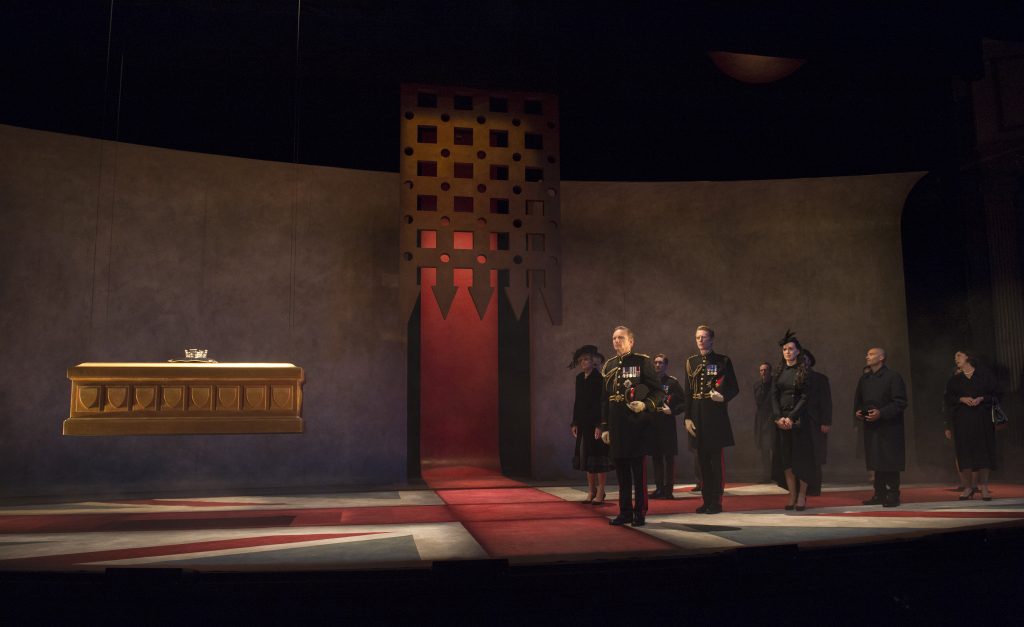
Credit: David Cooper
At The Stanley until November 19, 2017
Tickets from $29 at artsclub.com or 604-687-1644
Posted October 27, 2017
It’s a bit of a shock to see a coffin on The Stanley stage and realize that in Michael Bartlett’s play, it contains the body of Queen Elizabeth II. You have to wonder if the ninety-one-year-old queen saw the play in 2014 when it premiered at London’s Almeida Theatre and/or whether she watched the subsequent BBC2 television adaptation in the privacy of her own palace? Was she amused or did she shudder a little at Bartlett’s speculation on how things might roll out after her death? One Tory MP had this say following the BBC2 telecast: “It’s unfortunate the BBC would seek to promote this flight of fantasy, which many licence-fee payers will find distasteful and which I believe denigrates and undermines our royal family. I hope that the BBC will make clear that the production is pure fiction” to which the BBC tartly replied, “The public knows the difference between fact and fiction”.
King Charles III is fiction and bloody good fiction at that. It posits one possible – albeit improbable – ascension scenario while raising the issue of freedom of the press. With what’s going on in the Trump administration and the president’s accusations of “fake news”, it’s a hot topic.

Credit: David Cooper
The play opens following the funeral of Elizabeth II and the usual suspects are there: Charles, Camilla, William, Kate, Harry, the Prime Minister, the Leader of the Opposition and other dignitaries. The Queen is dead; long live the King. But even before the coronation, the PM presents, for the kings’ signature, a bill that will restrict freedom of the press. An ideologue, the king refuses to sign and civil strife ensues.
Written in the blank verse and iambic pentameter of Shakespeare, with obvious echoes of Macbeth and King Lear, Bartlett puts Charles at the centre of the age-old controversy over who really rules the realm. Is a nation a true democracy if a monarch can veto a bill passed in the House of Commons and the House of Lords?
Ted Cole is Charles, a bit bewildered and uncertain at first but eventually resolute. “I am the king”, he says, and we see him stand taller. Cole brings such quiet but perplexed dignity to the role that he elicits sympathy just as King Lear does in his dotage. The similarities – beleaguered by his offspring – are obvious.
Interestingly, the king’s strongest opponent amongst the royals isn’t his son William but Will’s wife Kate, portrayed by Katherine Gauthier, looking astonishingly like the Duchess of Cambridge, partly due to costume designer Christopher David Gauthier. He outfits the actor in high fashion coats and gowns that appear to come straight out of Kate’s closet. Oliver Rice portrays Prince William as affable but unfortunately malleable.

Credit: David Cooper
Gwynyth Walsh is a very sympathetic Camilla (wearing Camilla’s trademark, large picture hats) while Simon Webb, as the PM, comes across as a wheedling annoyance to the king. As the Leader of the Opposition, Christine Willes is, by turns, patronizing and backstabbing.
Charlie Gallant is freedom loving, redheaded Prince Harry ostensibly in love with Jess (lively Agnes Tong), an art school student with a questionable past.
Lauren Bowler plays the ghost of Lady Diana and in one of the most moving scenes, she embraces William, “the boy she never saw grow up to be a man.”

Credit: David Cooper
Set design by Kevin McAllister gives the show all the pomp and ceremony the script demands with a red banner down the rear wall and coming forward to the apron in the suggestion of the Union Jack. Echoes of various Shakespeare plays, the use of iambic pentameter and slightly archaic language lend weightiness to the play which, after all, is decidedly impudent in putting words into the mouths of persons still living.
Most characters in King Charles III have an opportunity to address the audience directly and when they do, the house lights come up. Audiences generally feel uncomfortable when that happens and wonder what the expectations are. But that discomfort is almost certainly what director Kevin Bennett intends and it’s a clever directorial choice.
The irony in Bartlett’s play is delicious: the king opposes restricting freedom of the press knowing full well it is the press’s insatiable thirst for scandal that led to the death of Lady Diana. It’s the stuff of classic Greek tragedy: the king is damned if he does and damned if he doesn’t.
King Charles III is not always an easy play to watch; it requires concentration and at two hours and forty-five minutes, it’s long. But as the Guardian’s Michael Billington wrote, “It’s royally entertaining.”

